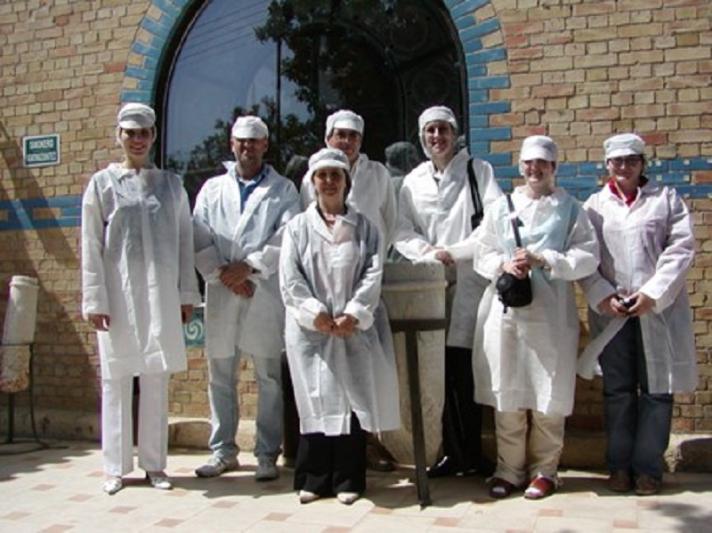Photo: Study trip to Greece - members of both teams during a study visit in the olive oil processing plant in Athens (May 2005)
On 22 January 2004, the implementation of the PHARE Twinning project on Integrated Pollution Prevention and Control Directive (IPPC) Directive with a duration up to 31 October 2005 was definitively approved. It was one of the last projects launched in Slovakia as a candidate country. The project partners were, on the Slovak side, the Ministry of the Environment, which entrusted the implementation to the Slovak Environment Agency; and on the Greek side, the Ministry of Foreign Affairs, which entrusted the implementation to the National Technical University of Athens and the European Public Law Centre based in Athens. The aim of the cooperation was to achieve full compliance of Slovak environmental legislation with Acquis in the EU IPPC Directive, to implement the requirements laid down in this Directive in the Slovak Republic.
Greek experts carried out an analysis of the differences between Slovak and EU legislation on IPPC with proposals to improve its implementation in national legislation. The teams of both countries worked on the preparation of proposals for individual databases for the Register of Operators and IPPC Installations and the Integrated Register of Information System, with the participation of the Slovak Environment Inspectorate, the Slovak Hydro-Meteorological Institute and the Ministry of Environment of the Slovak Republic. Following the proposals of individual databases, Slovak experts programmed the registers in question and tested them after entering the data, thus creating the basis for the IPPC information system.
A very important output of the almost two-year project was the training of trainers in the Slovak Environment Agency, including via study visits in the EU Member States (visit to the European IPPC Bureau in Seville - Spain, excursions to industrial installations under the IPPC regime in Greece). According to the requirements of the Slovak side, Greek experts prepared educational modules and training materials that were used later in training of state administration employees, industrial associations and state organisations working in the field of IPPC. At the end of the project, the two teams organized a conference to expand the project results and knowledge on the implementation of IPPC within the EU. Fifty-six experts from six EU countries and representatives of the European Commission (DG Environment) attended the conference.
“From the project emerged the foundation of the information system IPPC, with which we are still working, constantly improving it and expanding it according to the requirements of the successor Industrial Emissions Directive. The sustainability of the results of this project is remarkable. During the project, productive working relationships were established which resulted in continued cooperation with several experts from Greece in other international projects. In addition to merging European spirit and significant professional experience, the project brought us truly enriching friendships, which I personally value the most”, Blanka Kapustová, long-term IPPC/IED expert of the Slovak Environment Agency said.
From beneficiary to (Imple)Mentor
The seeds of Greco-Slovak cooperation sawn during the Twining project more than 18 years ago are bringing fruits in the long term. The strong professional and human bonds materialised again. Nowadays, Blanka Kapustová is on board of the Greek team helping the North Macedonia to get closer to the EU. She is taking active part in the Twinning project “Further strengthening the capacities for effective implementation of the acquis in the field of industrial pollution” (MN 20 IPA EN 02 22). She has been participating in a component aimed at harmonising the national legal framework with the EU acquis, which consists, in particular, in assessing existing legislation, evaluating shortcomings and developing draft legislation on industrial pollution.
Despite of the clear added value of the flow of know-how from the Member State to the beneficiary, the work of a short-term expert is also particularly beneficial for the expert himself: new experiences, new information, understanding of the realities of another country, other workflows, new contacts. This is an intensive exchange of experience; the experience gained through Twinning is invaluable and cannot be gained in any other way.
Thanks to the previous Twinning experience, Ms Kapustová was engaged also in other EU-funded projects in her field of expertise, for example in Serbia between 2012 and 2014 („Law enforcement in the field of industrial pollution control, prevention chemical accidents and establishing of the EMAS scheme“ implemented by AT, NL and HU consortium of 5 international consulting companies).
The IPPC/IED expert of the Slovak Environment Agency, Blanka Kapustová added: “As a short-term expert, I participated in the activities of the part of the project aimed at strengthening the quality and efficiency of the IPPC permitting process, developing an integrated permit model in accordance with European and Serbian legislation. This was the first time I found myself, on the other side of the table. While during the PHARE Twinning IPPC project from 2004 – 2005 in my country (Slovakia), I was on a beneficiary and “apprentice” side. In the Serbian project, as a short-term expert, I found myself in a “teacher’s” role and guided the candidate country how to approach the implementation of EU legislation.”
Project title: Implementation of the Integrated Pollution Prevention and Control Directive (IPPC)
Project ID: SK/02/IB/EN/02, 2004-2005

